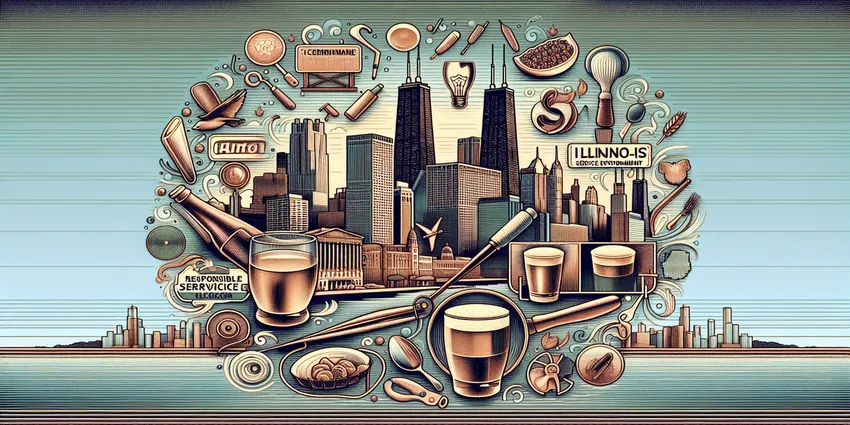TIPS Certification in Illinois: Key Takeaways
- TIPS/BASSET certification costs between $5.95 and $24.99 online in Illinois, with employers sometimes covering fees.
- TIPS certification is legally required statewide for bartenders, servers, managers, bouncers, and ID checkers.
- Certification lasts for 3 years and renewal requires retaking training and passing an exam.
Illinois mandates BASSET (TIPS equivalent) certification statewide for many alcohol-related roles to ensure responsible service.
This article provides a detailed guide on how to get your TIPS certification in Illinois, including application processes, costs, exam expectations, and renewal procedures.
If you are interested in bartender opportunities in Illinois, you can find hundreds of open positions on OysterLink.
Steps To Acquire a TIPS Certification in Illinois
Illinois offers TIPS/BASSET certification both online and in-person through approved BASSET programs.
Option 1: Online TIPS Certification
- Visit the official TIPS website or the Illinois Liquor Control Commission website for a list of approved BASSET providers.
- Select the appropriate course, such as TIPS On-Premise (for bartenders, servers, managers) or TIPS Off-Premise (for retail sellers).
- Register and pay the fee online, ranging from $5.95 to $24.99 depending on provider.
- Complete the self-paced 3-4 hour course covering Illinois alcohol laws and responsible service.
- Pass the required exam with a minimum score of 70%.
- Receive your electronic TIPS certification card upon successful completion.
To better prepare for a bartender career, review our steps to become a bartender to understand the skills and qualifications needed for this field.
Option 2: In-Person TIPS Training
- Find an ILCC-approved BASSET instructor offering in-person classes.
- Choose a convenient class date and location.
- Register and pay the fee, which may vary and is sometimes covered by employers.
- Attend the 3-4 hour classroom training with interactive lessons tailored to Illinois laws.
- Take the exam at the end of the session and must pass with 70% or better.
- Receive a physical or digital TIPS certificate.
Group training sessions are also available and commonly arranged by employers for staff convenience. Check with your employer for options.
Cost of TIPS Certification in Illinois
The price for TIPS certification online in Illinois ranges from $5.95 to $24.99 depending on the chosen provider.
Exact in-person course costs vary and are sometimes covered fully or partially by employers.
TIPS certification is valid for 3 years from the date of issuance, after which renewal is required.
What To Expect in the Illinois TIPS Training and Exam
TIPS training in Illinois focuses on key responsible alcohol service topics such as:
- Properties of alcohol and its effects
- Preventing intoxication and ensuring customer safety
- Illinois laws relating to minors and alcohol service
- Practicing refusal of sale/service to minors
- DUI penalties and dram shop liability
- When and how to ask for customer ID
- Rights to refuse service legally
At the end of training, you take a required exam with multiple-choice questions. To pass, a minimum score of 70% is necessary.
If you do not pass, unlimited retakes are allowed until you succeed.
For those preparing job applications, check out useful tips on crafting an effective bartender resume to improve your chances of getting hired.
Renewal and Maintaining TIPS Certification
The TIPS certification in Illinois lasts 3 years. Renewal requires retaking the BASSET training course and passing the exam again.
It is important to renew before expiration to maintain compliance and employment eligibility.
Who Needs a TIPS Certification in Illinois?
Illinois law requires TIPS/BASSET certification for anyone involved in alcohol service or checking IDs for alcohol sale, including the following roles:
- Bartenders
- Servers
- Managers
- Bouncers
- ID Checkers
Employers also typically require TIPS certification for these positions to comply with state laws and reduce liability.
Explore current bartender job openings on OysterLink if you are looking to start or advance your career in Illinois.
Benefits of Getting TIPS Certified in Illinois
Obtaining TIPS certification offers several advantages:
- Legal compliance: Meet Illinois state requirements for responsible alcohol service.
- Employment opportunities: Many employers mandate or prefer certified staff.
- Risk reduction: Helps prevent alcohol-related incidents and limits liability.
- Improved skills: Learn how to handle intoxicated customers and underage sales effectively.
- Professionalism: Certification demonstrates commitment to safe alcohol service.
Key Illinois Alcohol Laws Related to TIPS Certification
Understanding local laws is essential for responsible alcohol service in Illinois:
- Legal drinking age: 21 years old statewide.
- Alcohol sales hours: Vary according to local ordinances for both on-premise and off-premise sales.
- ID checking required: Must verify age for anyone appearing under 21.
- Dram shop liability: Businesses and servers can be held liable for damage caused by intoxicated persons they served.
- Refuse service rights: Sellers may legally refuse service to intoxicated or underage customers.
TIPS training prepares servers and managers to comply with these laws effectively.






Loading comments...